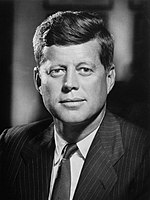| ||||||||||||||||||||||||||
All 14 North Carolina votes to the Electoral College | ||||||||||||||||||||||||||
|---|---|---|---|---|---|---|---|---|---|---|---|---|---|---|---|---|---|---|---|---|---|---|---|---|---|---|
| ||||||||||||||||||||||||||
| ||||||||||||||||||||||||||
| ||||||||||||||||||||||||||
| Elections in North Carolina |
|---|
 |
The 1960 United States presidential election in North Carolina took place on November 8, 1960, as part of the 1960 United States presidential election. North Carolina voters chose 14[2] representatives, or electors, to the Electoral College, who voted for president and vice president.
As a former Confederate state, North Carolina had a history of Jim Crow laws, disfranchisement of its African-American population and dominance of the Democratic Party in state politics. However, unlike the Deep South, the Republican Party always had sufficient historic Unionist white support from the mountains and northwestern Piedmont to gain minimally one-quarter and usually one-third of the statewide vote in general elections,[3] where turnout was higher than elsewhere in the former Confederacy due substantially to the state's early abolition of the poll tax in 1920.[4] Like Virginia, Tennessee and Oklahoma, the relative strength of Republican opposition meant that North Carolina never had statewide white primaries, although certain counties did use a white primary until it was banned by Smith v. Allwright.[5]
Following the banning of white primaries by the Supreme Court, North Carolina in 1948 offered less support to the Dixiecrat bolt than any other former Confederate state, due to the economic liberalism of its Black Belt and solid Democratic party discipline due to consistent Republican opposition.[6] Although there was little satisfaction with Harry S. Truman during his second term,[7] the loyalty of the white voters of the state’s Black Belt and the previously anti-Al Smith Outer Banks meant that unlike Texas, Florida and Virginia, urban middle-class Republican voting was inadequate to carry North Carolina for Dwight D. Eisenhower in either 1952[8] or 1956. Aiding this failure was that the growing urban black electorate, which had increased from under ten percent of voting-age blacks in 1940 to about a quarter in 1956,[9] was much more favourable to Adlai Stevenson II than in other former Confederate states.[a] In the 1958 midterm elections, Republicans in the state legislature were reduced to their lowest ever representation of five seats, although Charles R. Jonas did hold the Tenth District.
North Carolina would largely escape the overt “Massive Resistance” seen in neighbouring Virginia,[11] and four of its congressmen did not sign the Southern Manifesto.[12] Nonetheless, although the Greensboro school board voted 6–1 to desegregate within a day of Brown,[13] no serious desegregation would occur until well into the 1960s, while two non-signers would be challenged and defeated in 1956 primaries.[b] With the likely nomination of Massachusetts Senator John F. Kennedy to counter Eisenhower’s Catholic appeal in the Northeast,[14] speculation emerged that the anti-Catholicism that turned North Carolina Republican in 1928 would again become a powerful force,[15] and many Baptist pastors in the state did raise the religious issue.[16]
During 1960, the state would be affected by the Greensboro sit-ins. Dissatisfaction with the Democratic Party on civil rights, as well as support for him amongst certain anti-Catholic groups, meant that incumbent vice-president and Republican nominee Richard Nixon gained an enthusiastic reception when touring the state early in his fall campaign.[17] Polls in mid-October however favoured Kennedy,[18] and they continued to do so in the fourth week of the month.[19]
- ^ "United States Presidential election of 1960 — Encyclopædia Britannica". Retrieved June 8, 2017.
- ^ "1960 Election for the Forty-Fourth Term (1961-65)". Retrieved June 8, 2017.
- ^ Phillips, Kevin P. The Emerging Republican Majority. pp. 210, 242. ISBN 978-0-691-16324-6.
- ^ Key, Valdimer Orlando (1949). Southern Politics in State and Nation. Alfred A. Knopf. p. 502.
- ^ Klarman, Michael J. (2001). "The White Primary Rulings: A Case Study in the Consequences of Supreme Court Decision-Making". Florida State University Law Review. 29: 55–107.
- ^ Guthrie, Paul Daniel (August 1955). The Dixiecrat Movement of 1948 (Thesis). Bowling Green State University. p. 183. Docket 144207.
- ^ Grayson, A.G. (December 1975). "North Carolina and Harry Truman, 1944-1948". Journal of American Studies. 9 (3): 283–300.
- ^ Strong, Donald S. (August 1955). "The Presidential Election in the South, 1952". The Journal of Politics. 17 (3): 343–389.
- ^ Christensen, Rob (2008). The paradox of Tar Heel politics: the personalities, elections, and events that shaped modern North Carolina. Chapel Hill, North Carolina: University of North Carolina Press. pp. 264–265. ISBN 9780807831892.
- ^ Phillips. The Emerging Republican Majority, p. 299
- ^ Christensen. The paradox of Tar Heel politics, pp. 155-156
- ^ a b Badger, Tony (1999). "Southerners Who Refused To Sign the Southern Manifesto". The Historical Journal. 42 (2). Cambridge University Press: 528–532.
- ^ Telgen, Diane (2005). Brown v. Board of Education. Detroit, Michigan: Omnigraphics. p. 78. ISBN 9780780807754.
- ^ Phillips. The Emerging Republican Majority, pp. 169-174
- ^ Phillips. The Emerging Republican Majority, p. 221
- ^ Menendez, Albert J. (2011). The religious factor in the 1960 Presidential election: an analysis of the Kennedy victory over anti-Catholic prejudice. Jefferson, North Carolina: McFarland & Company. p. 32. ISBN 9780786460373.
- ^ White, Theodore Harold (1961). The making of the President, 1960. New York City: Atheneum Publishers. pp. 250, 268, 271.
- ^ Alsop, Joseph (October 16, 1960). "Dixie Democrats Feel Better and Thank You". The Nashville Tennessean. p. 5-B.
- ^ Poindexter, Jesse (October 22, 1960). "Senator Jackson Says Kennedy Has Won". Winston-Salem Journal. Winston-Salem, North Carolina. pp. 1, 3.
Cite error: There are <ref group=lower-alpha> tags or {{efn}} templates on this page, but the references will not show without a {{reflist|group=lower-alpha}} template or {{notelist}} template (see the help page).
© MMXXIII Rich X Search. We shall prevail. All rights reserved. Rich X Search




